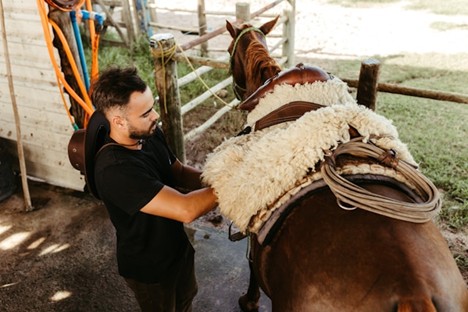
Adolescence is a critical developmental stage, marked by significant emotional, social, and psychological changes. Unfortunately, for some young people, this stage can become even more challenging due to trauma, mental health struggles, family dynamics, or environmental stressors. When adolescents face crises, they may feel overwhelmed, disconnected, or lost, leading to issues such as behavioral problems, academic struggles, or substance abuse.
In such cases, structured programs, such as residential treatment centers, therapeutic schools, or community-based initiatives, play an essential role in providing pathways to healing and growth. These programs are designed not only to address the immediate needs of adolescents in crisis but also to equip them with the tools to thrive in the future. Some of these programs incorporate modalities such as equine therapy, which helps adolescents build trust, emotional resilience, and self-awareness through interactions with horses.
Adolescents are navigating a period of intense change and self-discovery. Their sense of identity, relationships with peers and family, and emotional regulation are still developing. A lack of structure in an adolescent’s life, especially in times of crisis, can exacerbate feelings of confusion, insecurity, and instability. Structured programs offer consistency and a clear framework within which adolescents can rebuild their lives.
This environment provides a sense of safety, predictability, and routine, which is especially crucial for teens who have faced trauma or instability. Structure gives adolescents clear boundaries, rules, and expectations, all of which are fundamental to building trust, developing self-discipline, and learning responsibility. More importantly, these programs are designed to meet the emotional, physical, and psychological needs of adolescents, helping them address the underlying causes of their struggles while offering a safe and supportive environment for healing.
Residential treatment centers are one of the most common types of structured programs for adolescents in crisis. These programs offer a live-in facility where individuals receive 24/7 care and attention from professionals, including therapists, counselors, and educators. RTCs are designed for teens who require intensive support due to mental health issues, behavioral problems, trauma, or a combination of factors.
In this residential setting, adolescents are removed from potentially harmful environments, such as unstable family dynamics or high-risk peer groups, and placed in a space that prioritizes their well-being. The benefit is that it offers a holistic approach to healing, focusing on both immediate needs (such as safety and stability) and long-term outcomes (such as emotional growth and development of coping skills).
RTCs typically provide individualized treatment plans, combining therapy (including cognitive-behavioral therapy, trauma-focused therapy, and group therapy), education, recreational activities, and life skills training. This comprehensive approach helps adolescents not only cope with the crisis they are facing but also equips them with valuable tools that promote long-term mental and emotional resilience.
For teens whose crisis situations may be linked to academic challenges or learning difficulties, therapeutic schools can offer a valuable alternative. These schools combine traditional education with alternate therapeutic interventions, providing a safe environment where students can continue their academic journey while receiving the support they need to overcome personal challenges.
Therapeutic schools are ideal for students who may have experienced bullying, academic failure, or emotional trauma that has hindered their ability to succeed in a traditional school setting. In these programs, students receive individualized attention from both educators and mental health professionals. The structured school day includes academic lessons, as well as therapeutic activities such as counseling, group therapy, and mindfulness practices.
This combination of education and therapy helps students regain a sense of self-worth and purpose. Many therapeutic schools incorporate experiential learning, such as outdoor activities, art therapy, or animal therapy, to help adolescents process their emotions in a healthy and productive way. These schools are particularly beneficial for students who need a tailored approach to learning while also addressing the root causes of their emotional struggles.

In addition to residential treatment centers and therapeutic schools, community-based programs also play a key role in supporting adolescents in crisis. These programs are often less intensive than RTCs but provide vital resources to young people facing challenges in their everyday lives. Community-based programs can include mentorship programs, youth counseling services, group therapy, and even employment training or recreational activities. These programs are designed to promote emotional resilience, social skills, and conflict resolution abilities, allowing individuals to rebuild their lives within their communities.
Community-based programs can be particularly effective for teens who are at risk of falling through the cracks in the traditional educational or juvenile justice systems. These programs often work in tandem with local schools, law enforcement, and social service agencies to create a network of support. By focusing on creating positive relationships and a sense of belonging, these programs help adolescents regain their self-esteem and empower them to make better decisions for their future.
In many structured programs for adolescents in crisis, animal-assisted therapy has emerged as a powerful tool for healing. Working with horses has gained widespread recognition for its positive effects on emotional and behavioral issues. Horses, in particular, offer a unique form of therapy because they require individuals to interact in a calm, respectful, and consistent manner. These animals are sensitive to human emotions, providing immediate feedback on a young person's behavior and feelings.
Working with horses can help adolescents build trust, improve self-esteem, and develop important social and emotional skills. It encourages individuals to practice responsibility, empathy, and patience, which can translate into healthier relationships with themselves and others. Many residential treatment centers and community-based programs now incorporate this form of therapy as part of their holistic approach to adolescent care.
Structured programs also focus on equipping adolescents with practical life skills that they can carry with them beyond the program. These skills are essential for ensuring that teens have the tools they need to transition successfully back into their communities and lead fulfilling lives. Common life skills taught in these programs include:
Conflict Resolution: Helping adolescents learn how to navigate difficult situations and resolve disagreements in a peaceful, constructive way.
Communication: Teaching teens how to express their feelings, listen effectively, and build healthy relationships.
Time Management: Guiding adolescents to prioritize tasks, manage schedules, and take responsibility for their actions.
Financial Literacy: Providing basic education about budgeting, saving, and financial planning.
Self-Care and Wellness: Encouraging healthy habits, such as exercise, nutrition, and emotional regulation techniques.
These life skills empower adolescents to take control of their futures and ensure that they are equipped to face future challenges with resilience and confidence.
Adolescents in crisis face significant challenges, but structured programs provide pathways for healing, growth, and transformation. Whether through residential treatment centers, therapeutic schools, or community-based initiatives, these programs offer the support, guidance, and tools necessary for adolescents to overcome personal struggles and create a positive future.
The combination of structure, individualized care, therapeutic interventions, and life skills education allows teens to rebuild their lives, foster resilience, and develop the confidence they need to succeed. By addressing the unique needs of adolescents facing difficult circumstances, these programs offer hope, stability, and a brighter future for young people in crisis